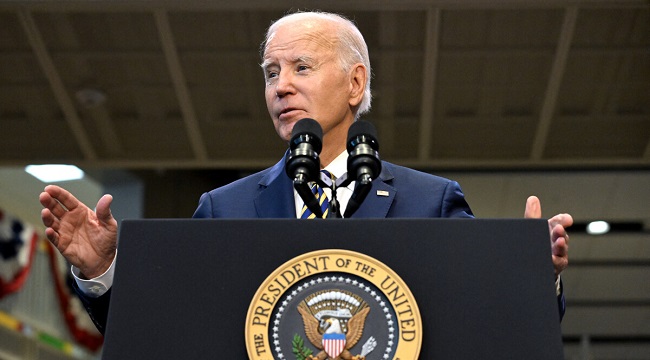President Joe Biden will make a landmark trip to Israel on Wednesday, a show of “ironclad” support as Washington tries to prevent the escalating war in Gaza from spilling over into regional conflict.
The trip comes just days after Gaza-based Hamas fighters broke through Israel’s heavily fortified border, shooting, stabbing and burning to death more than 1,400 people, most of them civilians.
Shell-shocked Israel has responded with withering air strikes on Hamas-controlled Gaza and by deploying tens of thousands of troops to the border in preparation for a full-scale ground offensive.
Secretary of State Antony Blinken said Biden’s visit would be a statement of “solidarity with Israel” and an “ironclad commitment to its security”.
Washington has already sent two aircraft carrier strike groups to the eastern Mediterranean “to deter hostile actions against Israel.”
Iran on Monday warned of a possible “pre-emptive action” against Israel “in the coming hours” and has repeatedly warned against a ground invasion of Gaza.
“The resistance leaders” will not allow Israel “to do whatever it wants in Gaza” said Foreign Minister Hossein Amir-Abdollahian.
On Tuesday, Israel said its troops had killed four militants attempting to infiltrate from Lebanon and launched strikes on Hezbollah “terrorist” targets in the country.
– ‘Real catastrophe’ –
While signalling support, Biden will also try to quietly steer Israeli’s military response, as critism grows about the devastating impact of the war on Palestinian civilians.
Israeli air strikes have killed several senior Hamas figures and targeted the organisation’s headquarters, according to the military.
But at least 2,750 Palestinians — mostly civilians — have also been killed, entire neighbourhoods have been razed and survivors are left with dwindling supplies of food, water and fuel.
Israel has demanded that residents of north Gaza leave for the south, hoping to clear the area of civilians in preparation for a perilous urban ground assault.
An Israeli military spokesman said it was unclear how Biden’s visit might change the timing of that operation.
UNRWA, the UN agency for Palestinian refugees, says more than one million Palestinians have fled their homes since the conflict began 10 days ago.
World Health Organization regional director Ahmed Al-Mandhari told AFP that Gaza was barrelling towards “real catastrophe”.
“There are 24 hours of water, electricity and fuel left,” he said.
Speaking after marathon talks with Prime Minister Benjamin Netanyahu in Tel Aviv, Blinken signalled there was no firm agreement yet on humanitarian relief.
But there was a “commitment” to work on a plan ahead of and during Biden’s visit, he said.
“At our request, the United States and Israel have agreed to develop a plan that will enable humanitarian aid from donor nations and multilateral organisations to reach civilians in Gaza,” Blinken said.
He said the two sides were discussing the “possibility of creating areas to help keep civilians out of harm’s way.”
Blinken said the US president hopes to “hear from Israel how it will conduct its operations in a way that minimises civilian casualties and enables humanitarian assistance to flow to civilians in Gaza in a way that does not benefit Hamas.”
Shortly after Blinken’s comments, officials in Egypt said relief convoys which have been waiting for days were headed towards the Rafah border crossing.
Still, the scale of the crisis is only slowly coming into view.
Since Israel’s evacuation order in north Gaza, entire families, young children and the elderly have gathered belongings and fled to southern Gaza, bedding down in any available space, indoors and out.
In the city of Khan Yunis in southern Gaza the normal population of 400,000 has roughly doubled.
Thousands more Palestinians have gathered at the Rafah border crossing with Egypt in an effort to flee.
“The situation is catastrophic beyond what I could have imagined,” said Jamil Abdullah, a Palestinian-Swede who is hoping to leave after being forced to sleep on the street.
“There are corpses in the streets. Buildings are crashing down on their inhabitants. Blood is everywhere. The smell of the dead is everywhere.”
AFP reporters in Gaza said mortuaries were overflowing, and corpses wrapped in white body bags were even being stored in an ice cream truck.
But Gazans are effectively trapped, with neighbouring Arab nations fearful that if Palestinians leave the Strip they could be permanently exiled.
Missing
In Israel, about 500,000 people have been displaced or evacuated from communities around the Gaza Strip and along the northern border with Lebanon, the military said.
Across the country, Israelis are still reeling from what is the worst attack in the country’s 75-year history, and one that shattered faith in the country’s government and much-vaunted security forces.
Merav Leshem Gonen is among those still anxiously waiting for news of loved ones.
Her daughter was kidnapped at a music festival near the Gaza border on October 7, one of at least 199 hostages Israel says were taken by Hamas or other groups.
“We don’t know anything else. She’s missing. That’s all we know, and we want her back alive. We want her to come back healthy,” she said.
Hamas’s military wing has said the group was holding 200 people, with about 50 more held by other “resistance factions and in other places”.
A video on Hamas’s official Telegram channel purported to show “one of the prisoners in Gaza”—a young woman speaking Hebrew and receiving treatment for an arm injury.
According to the caption, she was abducted on October 7. The video has not been verified by AFP.
AFP































